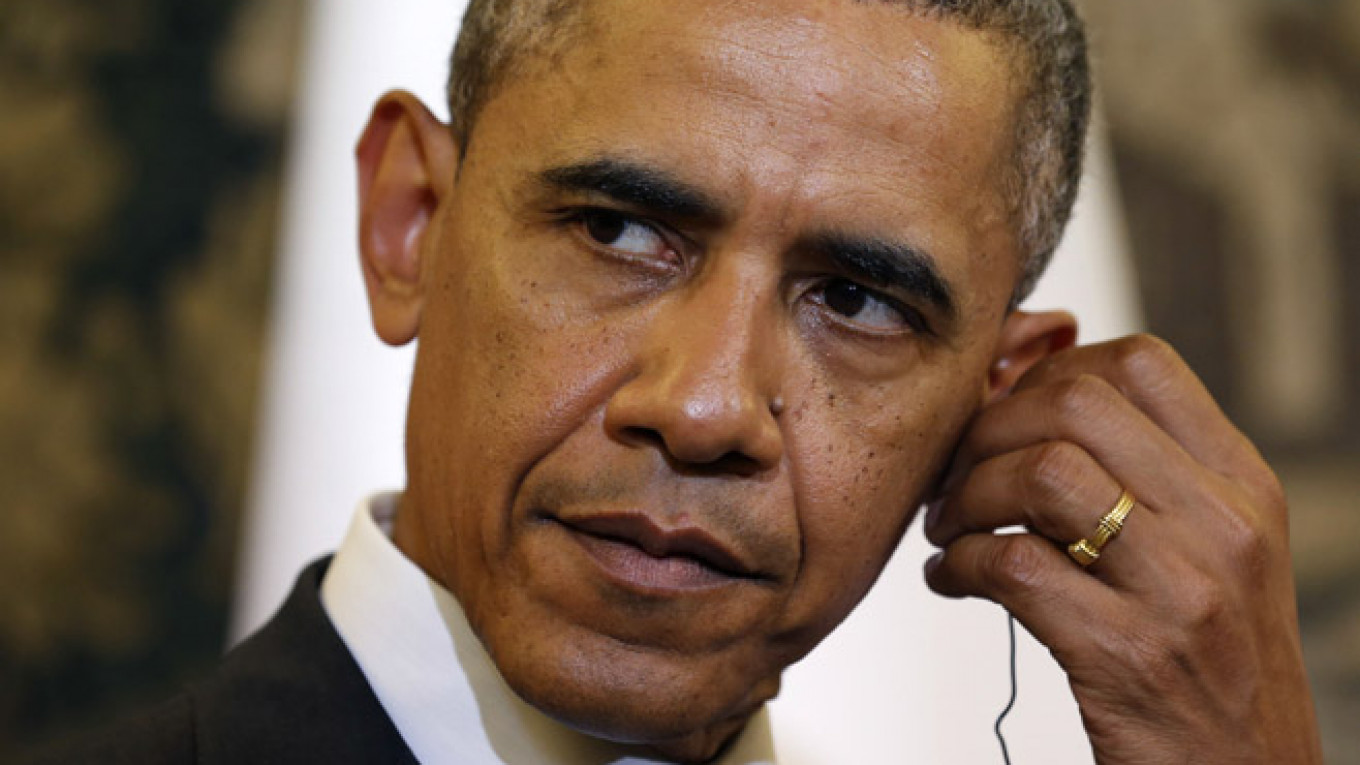The U.S. is preparing to boost its military presence in Europe and at a cost of up to $1 billion, U.S. President Barack Obama said Tuesday, as tensions in the region simmer over Russia's aggressive actions in Ukraine.
Standing with Polish President Bronislaw Komorowski, Obama said the U.S. plans to send more military equipment and rotate additional U.S. troops into the region. He called on lawmakers back in Washington to provide the funding to sustain the effort.
"Today, I am announcing a new initiative to bolster the support of our NATO allies here in Europe," Obama said at Warsaw's Belweder Palace. "Under this effort, and with the support of Congress, the U.S. will requisition more equipment in Europe."
If approved, the funding will be used to increase military exercises and training missions on the continent, as well as rotations of air and ground forces, the White House said. Officials said Obama was also seeking to ramp up U.S. Navy participation in NATO deployments in the Black and Baltic Seas, plus working to boost the military capacity of non-NATO countries that sit on Russia's border, including Ukraine, Georgia and Moldova.
Obama's announcement came at the start of a three-country swing through Europe steeped in both historical significance and regional anxiety over the crisis in Ukraine.
A day before his first face-to-face encounter with Ukraine's newly elected president, Petro Poroshenko, Obama said he wants both the U.S. and Ukraine to have good relations with Russia. But in a warning to Moscow, Obama said the U.S. has contingency plans to protect every member of NATO, and has been steadily developing those plans in recent years.
"Our contingency plans are not just pieces of paper on a shelf," Obama said, adding that the U.S. must and does have the ability to put those plans into effect if needed.
At the same time, he called on other NATO members to step up by increasing their own role in the alliance's collective defense, even as he acknowledged that the U.S. has greater capabilities to bear that burden than its smaller allies.
"Everyone has the capacity to do their fair share, to do a proportional amount to make sure we have the resources, the planning, the integration, the training in order to be effective," Obama said.
To that end, Komorowski announced that Poland intends to increase its own defense budget, up to 2 percent of the nation's gross domestic product. "It means it is a very tangible, very clear engagement," Komorowski said through a translator.
The cautionary notes from Obama and Komorowski came just a few days before a potential encounter between Obama and President Vladimir Putin, who also planned to be in France for the 70th anniversary of the D-Day invasion that eventually led to Allied victory in World War II. Obama and Putin have not met in person since the crisis began and have no meetings together scheduled, but White House officials have not ruled out that they could cross paths.
Calling his relationship with Putin "business-like," Obama said it is possible for the U.S. to rebuild trust with Putin, but that doing so would take time and require Putin to use his influence to calm unrest in eastern Ukraine.
"We are interested in good relations with Russia. We are not interested in threatening Russia," Obama said.
But he echoed previous warnings from the U.S. and other Western nations that "further provocation will be met with further costs." The U.S. and Europe have already levied sanctions against Russian officials, but are holding off on further sanctions amid Putin's vow to respect the results of Ukraine's recent presidential election.
NATO Secretary-General Anders Fogh Rasmussen hailed Obama's announcement of a bolstered U.S. presence on the continent.
"The U.S. has reacted swiftly after Russia's illegal military actions in Ukraine," Rasmussen said as he met with NATO defense ministers in Brussels. "And I appreciate that other allies have followed so that we can announce that all 28 allies are now contributing to reassurance measures."
Obama's visit to Warsaw coincides with the 25th anniversary of Poland emerging from communism. Obama also planned to meet with leaders of the Group of Seven leading industrial nations in Brussels before heading to France to mark the D-Day anniversary.
Later Tuesday, Obama and Komorowski planned to hold discussions on central European security with leaders from Bulgaria, the Czech Republic, Estonia, Croatia, Hungary, Latvia, Lithuania, Romania and Slovenia.
U.S. Secretary of State John Kerry was joining Obama for many of his events in Warsaw. During a separate meeting Tuesday with Poland's foreign minister, Kerry said the crisis in Ukraine presents "a new moment of challenge for all of us."
"Events in Ukraine have unfortunately unleashed forces that we had all hoped had been put away, were behind us, and so it requires new vigilance and it requires clear commitment," Kerry said.
See also:
In Europe, Obama Gets Second Chance to Explain His Russia Policy
A Message from The Moscow Times:
Dear readers,
We are facing unprecedented challenges. Russia's Prosecutor General's Office has designated The Moscow Times as an "undesirable" organization, criminalizing our work and putting our staff at risk of prosecution. This follows our earlier unjust labeling as a "foreign agent."
These actions are direct attempts to silence independent journalism in Russia. The authorities claim our work "discredits the decisions of the Russian leadership." We see things differently: we strive to provide accurate, unbiased reporting on Russia.
We, the journalists of The Moscow Times, refuse to be silenced. But to continue our work, we need your help.
Your support, no matter how small, makes a world of difference. If you can, please support us monthly starting from just $2. It's quick to set up, and every contribution makes a significant impact.
By supporting The Moscow Times, you're defending open, independent journalism in the face of repression. Thank you for standing with us.
Remind me later.






